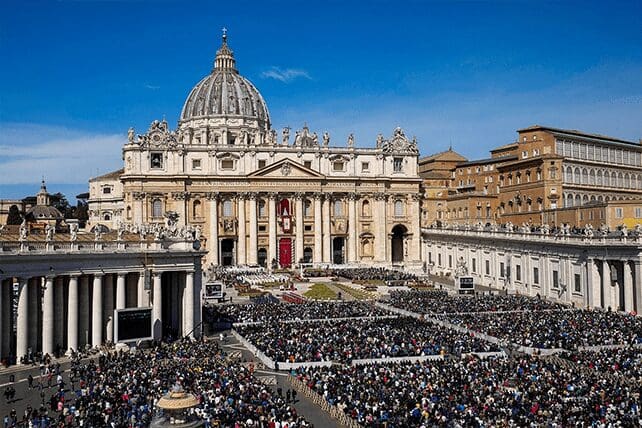VATICAN CITY (RNS) — Pope Francis has been clear about his vision for Catholicism as a “poor church for the poor” and the 2021 annual report of the Vatican bank shows that the pope’s wish is closer than ever to becoming a reality.
In the report published on Tuesday (June 7), the bank, officially the Institute for Religious Works, announced that it made a net profit of 18.1 million euros (about $19.3 million) last year, a significant decrease from the 36.4 million euros it netted in 2020, but which Vatican officials defended as an able effort in difficult times.
“This is certainly an important result considering the low yields on financial markets,” said Cardinal Santos Abril y Castelló, president of the Commission of Cardinals, which oversees the bank, in a statement accompanying the report.
“The wise and prudent choices made by management continue to pay off,” he added.
The report said that two years of the COVID-19 pandemic, plus the war in Ukraine, put a strain on the church’s finances and that the repercussions will continue to harm its prospects.
Perhaps in light of the financial corruption trial going on at the Vatican tribunal, which has shown how church funds found their way into movie production and luxury real estate deals, the commission also underlined its commitment to “Catholic consistent investment criteria in line with the social doctrine of the church.” But curtailing high-risk investments and restricting its managers to ethical investing likely impacted the IOR’s bottom line, the report said.
The bank also highlighted its successes, particularly the 2021 report by Moneyval, the European anti-money-laundering entity, which gave the institution a good rating.
The bank, which provides services to 14,519 individuals and entities located in 112 countries, closed roughly 3% of its accounts in 2021. “The opening and/or maintaining of accounts at the IOR is destined to become more and more selective in the following years in order to protect the Institute’s service mission,” the report stated.
The costs of the institution grew in 2021 due to expenditures for providing digital services for clients and hiring new managers and employees. Total assets declined slightly because it acquired a pension plan for its employees in compliance with legal and accounting requirements.
The Institute for Religious Works was created in 1942 as a means to safely distribute funds to Catholic missions and dioceses during the Second World War. But since its founding, the bank has endured one wave of financial scandals after the next, the most recent resulting in the abrupt resignation of its president, Ettore Gotti Tedeschi, after the Vatileaks scandals of 2012.
A Vatican trial found a former president of the bank, Angelo Caloia, guilty of money laundering, embezzlement and misappropriation of funds in January 2021. In 2022, former IOR employees were also brought to trial and found guilty of corruption.

